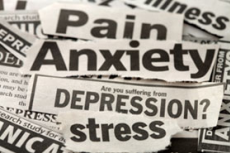
As you grow up and get older, you’ll probably start to notice that your problems become bigger and less easy to deal with. Remember when your biggest fear was a bruised knee, or a cut on the arm, and you’d usually be fine within a couple of days? As we grow up we start to worry about things like relationships, work, exams and other stressful situations that come our way. The troubles of living in the modern, demanding world can take its toll on us, and we have to be careful of letting it overwhelm us. As a teenager, we can be at greater risk, and it’s important to combat a problem before it grows even bigger.
One common problem is anxiety. We can all get stressed or worried sometimes, but anxiety is when it takes over our lives. For example, everyone can be stressed about an exam, but if that stress consumes your everyday life, it can be problematic. Common symptoms of anxiety include a constant feeling of being worried, a fear of worry itself, and a sense of dread. It can also mean you have physical symptoms, like a feeling of weight on your heart, or an irregular heartbeat. If it starts affecting your everyday life, see a doctor. There are plenty of counselling services across the country that are designed for young people, so ask your GP for information.
If the feelings of being “on edge” are constant, you may have generalised anxiety. If you get particularly nervous about social situations, then you might want to do some research on social anxiety. If meeting your friends is something that you really stress out about, and it impacts on your enjoyment, consider getting some advice from a youth centre. They can point you in the right direction for helping you to feel better.
Depression is also very serious, and affects many teenagers. Depression is complicated, and if it’s not tackled too soon, it can be devastating. If you feel a continuous sense of being blue, and you can’t put your finger on it, it could be a bad sign. People with depression often want to isolate themselves from people they care about, or struggle to motivate themselves/get out of bed in the morning. Talk to your parents, a close friend, or a teacher that you trust if you are concerned you have any of these symptoms. It’s best to open up to someone, rather than keeping it all bottled up. If you do this, the pressure will certainly become too much, and it will be a lot worse.
But after all this, the good news is that help is easy to find. GPs, youth centres, advice centres, support groups and therapies exist everywhere – even online. Go onto the NHS choices website for more help and guidance. A popular therapy used for depression and anxiety is cognitive behavioural therapy, which tries to change the way your thought process works. It tries to stop the negative spiral before it can develop into something worse. This can be found online, through the NHS, or through Youtube. See your GP for more information, but make sure you talk to one you can confide in!
Image credit: http://depressingquotes.org/anxiety-and-depression/

0 Comment:
Be the first one to comment on this article.